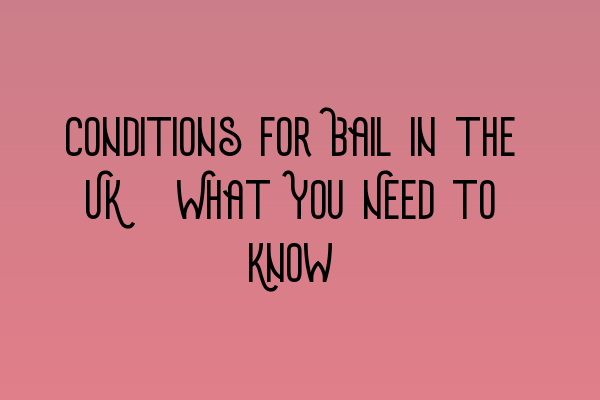Conditions for Bail in the UK: What You Need to Know
Bail is a crucial aspect of the criminal justice system in the United Kingdom. It allows individuals accused of a crime to be temporarily released from custody while awaiting trial or other legal proceedings. However, bail is not granted unconditionally. There are certain conditions that must be met to ensure the safety of the public and the likelihood of the accused appearing in court. In this article, we will discuss the various conditions for bail in the UK and provide you with the information you need to know.
1. Surety
One common condition for bail in the UK is the requirement of a surety. A surety is a person who agrees to be responsible for the accused and ensures that they comply with all bail conditions. The surety is usually a family member or a close friend of the accused.
If the accused fails to comply with the conditions of bail, the surety may be required to pay a specified amount of money or forfeit any assets they have pledged as security. This condition acts as an incentive for the accused to adhere to the terms of their release.
For more information on legal representation for Delaware LLCs in the UK, click here.
2. Residence
Another condition for bail in the UK is the requirement for the accused to provide a verifiable address where they will reside while on bail. This helps authorities keep track of the accused and ensures that they can be located if necessary.
The accused may be required to report to a police station or a designated officer at regular intervals to confirm their attendance and maintain their residency condition. Failure to comply with this condition may result in the revocation of bail and the accused being remanded back into custody.
3. Non-Contact
In cases where the accused is charged with a crime against a specific individual, such as harassment or assault, a condition of non-contact may be imposed. This means that the accused is not allowed to have any form of contact, direct or indirect, with the alleged victim.
The non-contact condition is designed to protect the alleged victim from further harm or intimidation. Violating this condition can lead to serious consequences, including the revocation of bail and additional charges being filed against the accused.
To learn more about ensuring ethical business practices in Delaware, click here.
4. Surrender of Passport
In cases where there is a risk that the accused may attempt to flee the country, a condition for bail may be the surrender of their passport. This condition prevents the accused from leaving the UK while the legal proceedings are ongoing.
The surrender of passport condition is particularly common in cases involving serious offenses or where there is a significant flight risk. It is a precautionary measure aimed at ensuring that the accused remains within the jurisdiction of the UK courts.
5. Curfew
For certain offenses, a curfew condition may be imposed as part of the bail conditions. The accused is required to remain at a specific location during designated hours, typically during the evening and overnight.
The curfew condition is often used in cases where the accused poses a moderate risk to the public or where there is a need to monitor their activities closely. Failure to comply with the curfew can result in the revocation of bail and the accused being returned to custody.
If you want to learn more about UK criminal law and the British legal system, click here.
Conclusion
Bail is an important legal mechanism that allows individuals to be released from custody while awaiting trial. However, there are conditions for bail in the UK that must be met to ensure the safety of the public and the proper administration of justice.
These conditions may include the requirement of a surety, a verifiable address of residence, non-contact with victims, surrender of passport, and adherence to a curfew. Failure to comply with these conditions can lead to severe consequences, including the revocation of bail and further legal trouble.
Understanding the conditions for bail is crucial if you are facing criminal charges or have a loved one who is. It is essential to consult with an experienced criminal law solicitor who can guide you through the process and help you navigate the complexities of bail conditions.
To learn more about legal challenges for UK businesses in the U.S. and strategies for overcoming hurdles, click here.
